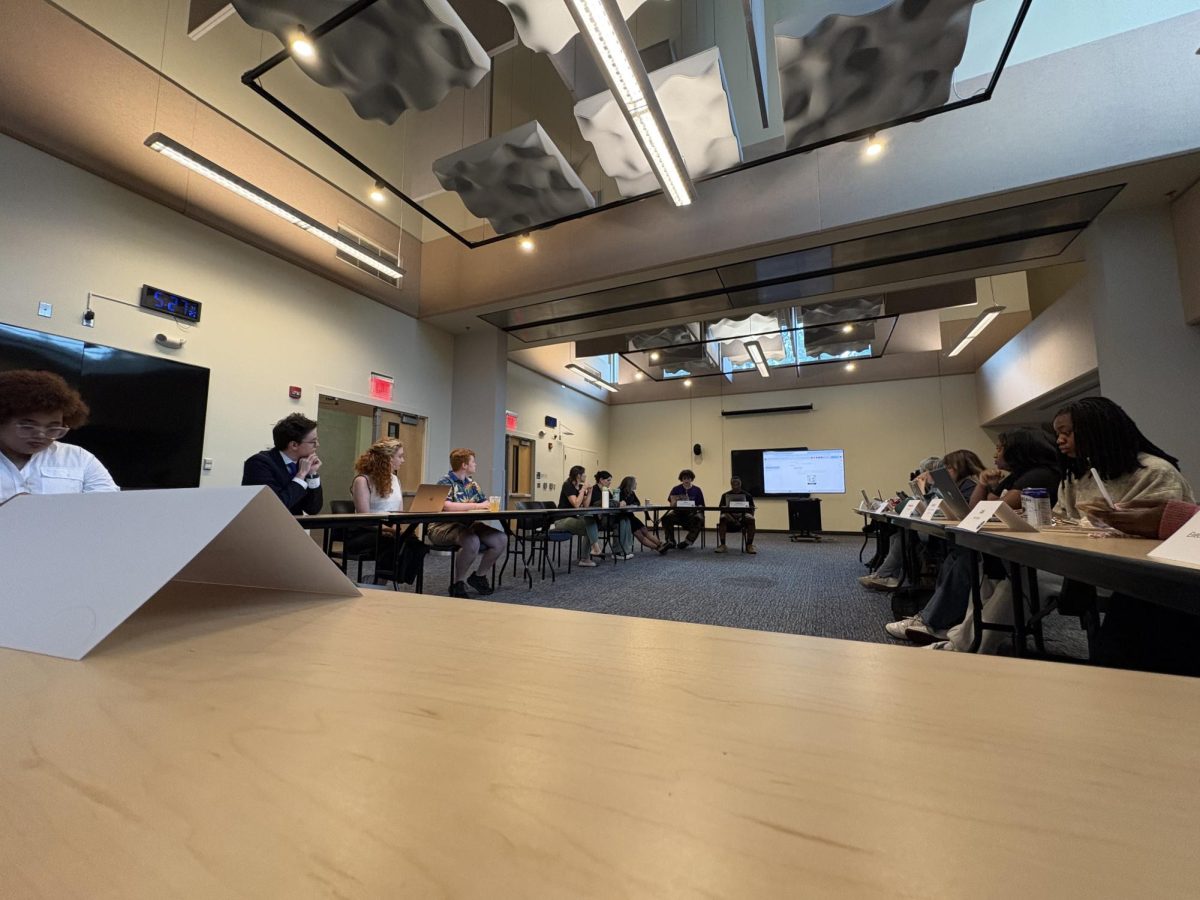By Anna Frate – [email protected] – Contributor
For Olufemi Lewis, an African-American single mother with a criminal background, living in poverty became her lifelong sentence.
Desiring liberation for herself, her community and her children, Lewis created a business model for a mobile market she calls Ujamaa Freedom Market.
“Life happens and bad choices are made, then you just get stuck in this rut,” Lewis said. “My business partner and I both have criminal backgrounds, and the system that’s in place is not structured for us to be successful, for us to be productive citizens of society.”
According to Lewis, she expects her mobile market to succeed, because they will accept food stamps as a form of payment.
“When you make it hard for people to have the right to eat healthy wholesome food, then you pretty much take away their freedom. You are putting limitations on them,” Lewis said.
Operating under a cooperative business structure, Lewis said she hopes to create change in the black community.
“I think the major factors that contribute to communities or individuals struggling with food security are imperialism and white supremacy,” Lewis said. “Depending on a government or an institution to provide for us – that’s where all of us have messed up, no matter what color we are.”
According to Lewis, until growing her own produce becomes viable, her mobile market will sell local fruits and vegetables.
“I want to let people know that there’s freedom to having access to the foods that you need. Liberation through cooperation. I think that line pretty much sums up the significance to our business name,” Lewis said.
The inspiration for starting a business focused on providing fresh produce to community members comes from experiencing hunger, Lewis said.
“I have been that child that couldn’t wait until Monday morning came because I knew I could get breakfast at school and I knew that I was going to have lunch. When I came home in the evening, having food depended on what had happened in my mom’s day,” Lewis said.
Children go hungry
The U.S. Department of Agriculture defines food insecurity as the lack of access to adequate food resulting from the lack of money and other resources.
According to MANNA FoodBank, one out of four children in western North Carolina live in conditions of food insecurity. Their program, Packs for Kids, ensures children from low-income households go home with a bag of non-perishable food at least once a week.
“We have six students in our class that receive these bags, I think that might be the biggest number in the whole school per class,” said Amanda Trader, assistant teacher at Ira B. Jones Elementary School.
Packs for Kids reaches more than 4,000 children per week across the MANNA’s 16-county service area, according to organization members.
“Every Monday and Friday, certain students get a bag of food from MANNA to take home with them,” Trader said. “Approximately one-third of my students need help with food, so it’s a really great program.”
Reactions vary among students receiving the bags. While some show excitement, others struggle with the stigma of being poor, according to Trader.
“One student said he didn’t want to bring home the bags because they were too heavy for him,” Trader said. “I tried putting it in a tote bag, but he wouldn’t bring it back to school.”
According to MANNA FoodBank, 47 percent of Asheville City school children qualify for free or reduced-rate lunches.
“I student taught at Emma Elementary in West Asheville, and their population was almost 90 percent free lunch; it was huge,” Trader said.
According to the Department of Education, Title I of the Elementary and Secondary School Act provides financial assistance to schools with a high number of low-income families.
“Right now, Jones Elementary is in danger of losing its Title I status, and that’s not necessarily because there’s not enough kids there who need free lunches,” Trader said.
Parents intimidated by the paperwork or being too embarrassed to sign up may be the biggest issue the school faces, according to Trader.
“If we dip below a 40 percent population proving a need for services, then we will lose the Title I status, and that would hurt the whole school,” Trader said. “We’re trying to reach out right now to these families and help them fill out the paperwork so that we can keep receiving funds from the federal government.”
Prices rise while funding gets cut
According to MANNA, November 2013 marked the start of major cuts in benefits such as food stamps. Throughout the 16 counties of their service area, the cuts meant a total loss of 336,882 meals in just one month.
“There’s not a lot of security for anybody except for the very top,” said Becky Upham, communications and marketing director of MANNA FoodBank. “Affording healthy food has become a luxury.”
Lewis said she struggles to feed her children even with the assistance of food stamps due to the rising cost of food.
“Even at times when I was making a decent amount of money, I wasn’t able to afford healthy food,” Lewis said.
MANNA FoodBank increased their output of fresh produce by 40 percent last year, according to Upham.
“We’re always grateful for all that we get, but at the same time, we’re getting a little more vocal in our mission to focus more on healthy food because it’s expensive; it’s a luxury,” Upham said.
College students protest waste
The organization Food Not Bombs protests food being associated with anything besides basic human rights, according to Pete McKelvey, one of the founders of the Asheville chapter.
“We serve free food on Sundays in Pritchard Park,” McKelvey said. “There are a few churches that have food available for homeless folks, too, but a lot of those places require that you attend the service or that you help spread their word, and on top of that, the food is really unhealthy.”
The group prepares and serves donated food in an effort to prove feeding communities without spending money is possible, according to Sarah Cohen, co-founder of the Asheville chapter.
“It’s different for each chapter, but the main idea is advocating for nonviolent direct action and feeding people for free,” Cohen said.
According to McKelvey, governments tend to spend more on war than on the accessibility of food.
“It’s called Food Not Bombs, because it’s kind of a juxtaposition on things that our country and our world spends a lot of money on that are totally useless and something our world spends very little on that is actually vital to our survival,” McKelvey said.
Food Not Bombs chapters exist throughout the world and do not rely on leading organizers. The Asheville group consists mostly of students attending classes at UNC Asheville, according to Cohen.
“We try to be as consistent as possible, but over breaks and things, it’s more difficult,” Cohen said.
According to the Society of St. Andrew, the United States spends $1 billion a year to dispose of food waste.
“There’s a lot of food that gets wasted that we can use toward feeding people,” Cohen said.
The amount of food wasted in the United States can be attributed to a culture obsessed with appearance, according to Bill Walker, gleaning coordinator of Society of St. Andrew for western North Carolina.
“It has to do a lot with the pickiness of American consumers. Certain-size tomatoes or peppers or whatever will sell in grocery store. If a farmer picks something that’s not perfect, it just gets thrown away,” Walker said.
Categories:
Low-income families in WNC struggle with access to healthy foods
February 5, 2014
0
More to Discover


















